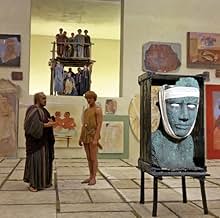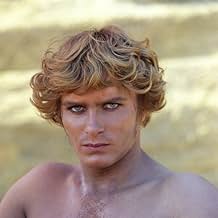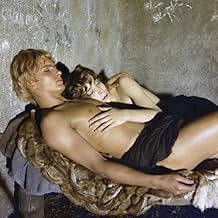Eine Reihe von unzusammenhängenden mythischen Erzählungen, die im Rom des ersten Jahrhunderts spielen.Eine Reihe von unzusammenhängenden mythischen Erzählungen, die im Rom des ersten Jahrhunderts spielen.Eine Reihe von unzusammenhängenden mythischen Erzählungen, die im Rom des ersten Jahrhunderts spielen.
- Für 1 Oscar nominiert
- 5 Gewinne & 8 Nominierungen insgesamt
- Trimalcione
- (as Il Moro)
- Scintilla
- (as Danica la Loggia)
- La matrona
- (as Lucia Bosé)
- Il suicida
- (as Joseph Weelher)
- Minotauro
- (as Luigi Montefiori)
Empfohlene Bewertungen
The film is freely adapted from Petronius' book, which is the exploits of two young Romans, Ascilto and Encolpio, as they venture throughout the empire, indulging in both heterosexual and homosexual relationships In the course of this proliferation of sensuality, Ascilto becomes impotent and madly goes for a cure which ends in tragedy for Encolpio
The movie's treatment of the sexual decadence is remarkably powerful without being explicit In fact, in light of the mental images it presents, it actually puts on view very little on screen But there is a great quantity of mysterious whores, hedonists, gluttons, and gross indulgence in carnal pleasure In the midst of this chaos, however, there is a beautifully light reprieve as the young Romans come across a forsaken villa... A very charming slave girl has remained behind, and she playfully troubles the two men into an erotic game
Apart from that, the sex is portrayed as bizarre, tempting, suggestive of hidden secrets, violating the rules of morality, and going beyond the limit
Wusstest du schon
- WissenswertesGian Luigi Polidoro registered the title Die Degenerierten (1969) for his movie first. Federico Fellini fought to use the title for his movie but lost the case. Subsequently the title was changed to Fellini Satyricon.
- PatzerIn one version, Joseph Wheeler is credited as 'Joseph Weelher'.
- Zitate
Soldier at Tomb: They've stolen the hanged man! While I was with you, the thief's family took him away! I know what punishment I'll get... a horrible death. Why should I wait for it? I'd rather die by my own hands.
[pulls his sword out and is about to stab himself]
Wife of Ephesus: [stops him] No! No, my dear... To lose the two men in my life, one after the other, would be too much...
Wife of Ephesus: [looks at the corpse of her husband] Better to hang a dead husband than to lose a living lover.
[the couple replace the missing hanged corpse with the corpse of her husband]
- VerbindungenEdited into Fellini - Ich bin ein großer Lügner (2002)
- SoundtracksThe Drums for the Niegpadouda Dance
From Anthology of Music of Black Africa
Recorded by Everest Records
Arranged by Bernard C. Salomon
Published by Arvon Music
Top-Auswahl
- How long is Satyricon?Powered by Alexa
Details
Box Office
- Budget
- 3.000.000 $ (geschätzt)
- Bruttoertrag in den USA und Kanada
- 1.135.943 $
- Weltweiter Bruttoertrag
- 1.138.108 $
- Laufzeit
- 2 Std. 9 Min.(129 min)
- Sound-Mix
- Seitenverhältnis
- 2.35 : 1






































